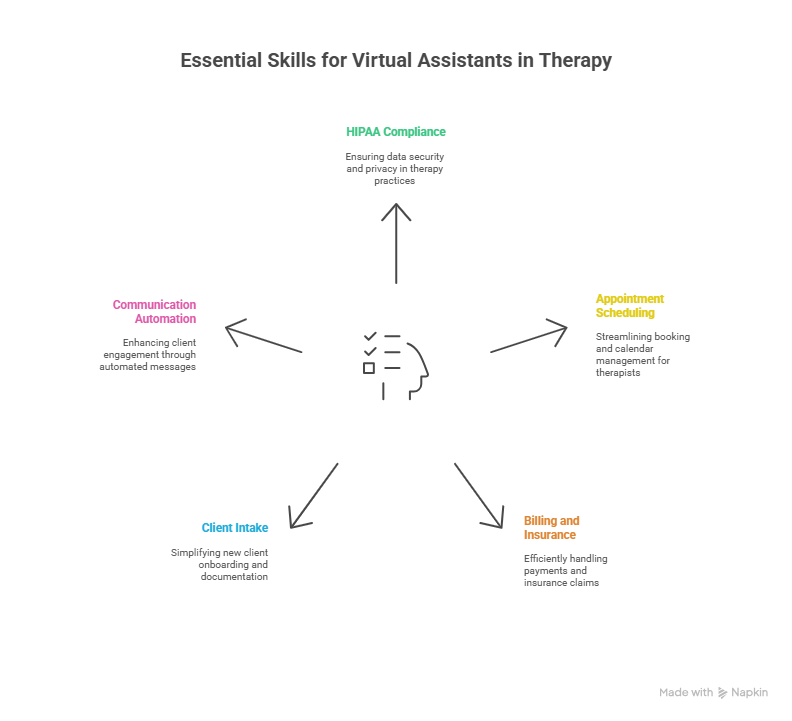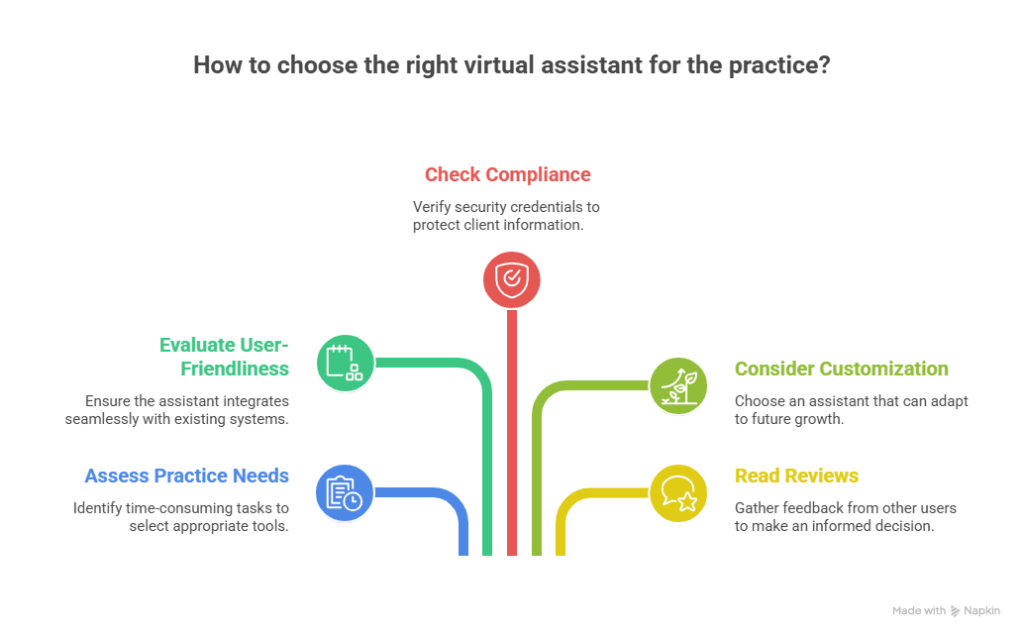Virtual Assistant for Therapists: Streamline Your Practice Efficiently
24 Sep 2025 By: Mary Dellosa
Updated

Therapists today must care deeply while juggling heavy admin work. Managing sessions, billing, and schedules can drain focus from helping clients. A virtual assistant for therapists helps ease that load. They streamline tasks, cuts stress, and boosts the client experience.
Why Therapists Need Virtual Assistants
The mental health field is growing fast. Jobs for counselors are set to rise 22% from 2020 to 2030. With more clients, therapists face more admin tasks. Many avoid tech due to privacy risks and tough healthcare rules.
Virtual assistants made for therapists solve this. They follow HIPAA rules and handle tasks like booking, reminders, billing, and intake. This frees up time for care.
The Administrative Burden on Therapists
Therapists spend up to 30% of their time on admin work. This includes calendars, claims, records, and emails. These tasks drain energy and cut client time. Virtual assistants reduce the load by automating jobs and syncing with practice tools. This saves hours each week for client care.
Admin work also fuels burnout in mental health pros. Balancing care with busy tasks lowers job joy. Virtual assistants ease stress and free time for self-care and growth.
Enhancing Client Engagement and Retention
Client engagement drives therapy success. Virtual assistants boost it with reminders that cut no-shows by up to 50%. They also help with rescheduling and share follow-ups. This keeps clients informed and valued, which strengthens trust and improves results.
They also send surveys and check-ins to gather feedback. Therapists use this data to adjust care and meet client needs. This keeps clients involved and leads to better outcomes.
Essential Skills a Virtual Assistant for Therapists Should Have
Not all virtual assistants fit therapy work. Therapists need support that ensures privacy, follows rules, and runs smoothly. Here’s what to look for when choosing one.

HIPAA Compliance and Data Security
Therapeutic confidentiality is a top priority. Virtual assistants should stick to the HIPAA law preventing the scrutiny of client data. This means using encrypted chats, secure storage, and tight access. Strong security keeps both clients and therapists safe. Regular checkups and updates help stop new threats and show clients their privacy truly matters.
Appointment Scheduling and Calendar Management
Automated tools let clients book sessions online, saving time. They sync with calendars to avoid double bookings and allow easy changes. Buffer times and custom hours help cut conflicts. Some tools also track booking trends to improve access and grow the practice.
Billing and Insurance Processing
Handling payments and insurance takes time and effort. Virtual assistants can send invoices, track payments, and file claims online. They work with payment tools and insurance systems to speed up tasks and cut errors. They also create reports to show how the practice is doing, helping with smart money choices.
Client Intake and Documentation
Virtual assistants help new clients fill out intake forms before sessions. This saves time and gives therapists key info early. Some also take notes or transcribe, cutting admin work. Templates for plans and notes keep records clear and make tracking progress easier.
Communication and Follow-Up Automation
Consistent communication helps keep clients engaged. Virtual assistants send reminders, follow-ups, and share resources between sessions. They can also send custom messages based on goals or milestones, deepening client trust. Feedback tools give insight into client needs and help improve care over time.
What are the Benefits of Using a Virtual Assistant for Therapists?
Having a virtual therapy assistant can change a therapy practice fast. They save time, boosts care, raises income, and lowers stress for therapists.
Increased Efficiency and Time Savings
Virtual assistants handle the busy work like billing and reminders so therapists can focus on their clients. With less stress, they have more time and energy to care.
Improved Client Experience
Clients feel more supported with simple booking, friendly reminders, and quick help when they need it. A check-in or kind message shows someone cares. That extra touch helps build trust, keeps clients coming back, and often leads them to share their good experience with others.
Reduced Administrative Errors
Manual paperwork often leads to mistakes, like billing errors or missed steps. Virtual assistants help by automating tasks and keeping records accurate. They also make sure intake forms are filled out safely and fully. This protects client privacy and keeps the practice running smoothly. With fewer errors, therapists stay on track with rules and build more trust with clients.
Cost-Effectiveness
Hiring full-time help can be pricey, especially for solo therapists. Virtual assistants cost less and offer flexible plans to match different needs. Therapists can scale support up or down based on their workload. No extra costs for training, benefits, or office space makes it a smart money choice.
Support for Teletherapy and Hybrid Models
Teletherapy has altered the therapists’ work processes. The support of virtual assistants comes in the form of arranging online appointments, organizing documents, and connecting with video tools. This fits the needs of clients who now prefer remote care. They can also help create webinars or videos to support and educate clients. By utilizing virtual assistants, therapists stay flexible, helpful, and ahead in a changing world.
How to Choose the Right Virtual Assistant for Your Practice?
Choosing the right virtual assistant means knowing what your practice needs, what you can spend, and how comfortable you are with tech. Here are some simple tips to help.

Assess Your Practice Needs
Start by spotting which tasks take up your time or cause stress. It might be booking, billing, or client messages. Knowing this helps you pick the right tools. If scheduling is hard, choose a virtual assistant who has an experience with simple rescheduling. Also, think about how many clients you see. You’ll need a system that runs well, even when things get busy.
Evaluate User-Friendliness and Integration
Pick a virtual assistant that should have the experience in with what you already use like your calendar or billing tools so nothing feels new or tricky. Look for one with good support and simple steps. A clear, friendly layout makes daily work feel easier.
Check Compliance and Security Credentials
Make sure the virtual assistant keeps your clients’ info safe. It should follow HIPAA rules and use strong privacy tools. Ask how they handle problems if something goes wrong. This helps you worry less and shows clients you’ve got their back.
Consider Customization and Scalability
Your practice will grow, so choose a virtual assistant that can grow with you. Look for one who can grow with you as your needs change. Make sure it can handle more patients or locations if needed. Flexibility now saves stress later.
Read Reviews and Request Demos
Before choosing a virtual assistant, see what others say. Read a few reviews. Talk to someone who uses it and ask how it’s going. Try it yourself—see if it feels easy and comfortable. Choose a provider that’s simple and keeps getting better. If they listen to feedback, they’ll likely be there when you need help too.
Implementing a Virtual Assistant: Best Practices
Bringing in a virtual assistant takes some planning. They help things run better without causing stress. Here are a few simple tips to make the switch smooth.
Train Your Team and Clients
Make sure your team knows your virtual assistant well. Give clients simple steps and help so they feel comfortable, even if they aren’t tech-savvy.
Maintain a Human Touch
Automation helps, but therapy still needs a human touch. Let virtual assistants handle tasks and patients by keeping real care and connection in your client talks.
Regularly Review and Optimize
Keep an eye on how the virtual assistant is working. Ask clients and staff for feedback. Watch things like no-shows and billing mistakes. Make changes if needed.
Stay Updated on Compliance
Healthcare regulations evolve, so stay informed about changes that may affect your virtual assistant’s operation. Regularly make updates and review security measures to maintain compliance.
Trending Now
In a review, Van Hoy amalgamated 52 research works to get a clearer picture of the factors underlying both burnout and wellbeing among psychotherapists. It reveals that getting overwhelmed, feeling unsupported, or having little control over the work process can easily bring about burnout, more so with not very experienced or younger therapists. Conversely, being well supported, working on one’s self through mindfulness, applying healthy coping strategies, and undergoing supervision or having personal therapy do a lot of good in protecting one’s mental health.
The research also points out that while we know a lot about the risks, there’s still less focus on what helps therapists thrive. In the end, the message is clear: taking care of psychotherapists’ mental health isn’t just good for them, it’s essential for the people they care for.
Conclusion
Virtual assistants take care of the small tasks such as booking, billing, and sending reminders that help therapists concentrate on the patients. It reduces stress and gives more time for the essential things. Select the one that seems appropriate for you, assures confidentiality of the client data, and is quite adaptable.
An ideal assistant keeps you organized, secures client information, and ensures that your practice operates without any hiccups. It means having a reliable partner with you every single day. Do you want to have a more convenient workday? TryHelpSquad Health’s virtual assistant services and see the difference for yourself.
What is a virtual assistant for therapists?
A virtual assistant for therapists is a remote support professional (or service) that handles administrative and client-facing tasks like scheduling, reminders, intake, billing, and follow-ups, so therapists can spend more time on clinical work and less time on operations.
Why do therapists need virtual assistants now more than ever?
As demand for mental health services increases, therapists face heavier admin workloads alongside full caseloads. A virtual assistant helps reduce day-to-day operational stress, improves organization, and protects therapist energy for client care.
How much time can a virtual assistant save a therapist each week?
The article notes therapists can spend up to 30% of their time on administrative tasks. By delegating scheduling, reminders, billing, and intake support, a virtual assistant can reclaim hours each week, often enough to add sessions or reduce burnout.
What admin tasks can a virtual assistant handle for a therapy practice?
Common tasks include calendar and appointment management, rescheduling, reminder messages, email organization, intake form coordination, documentation support (templates and organization), billing follow-ups, invoicing, and basic insurance processing.
How does a virtual assistant improve client engagement and retention?
Virtual assistants keep clients informed and supported through timely reminders, follow-ups, and easy rescheduling. This consistent communication helps clients feel cared for, reduces confusion, and encourages ongoing participation in therapy.


